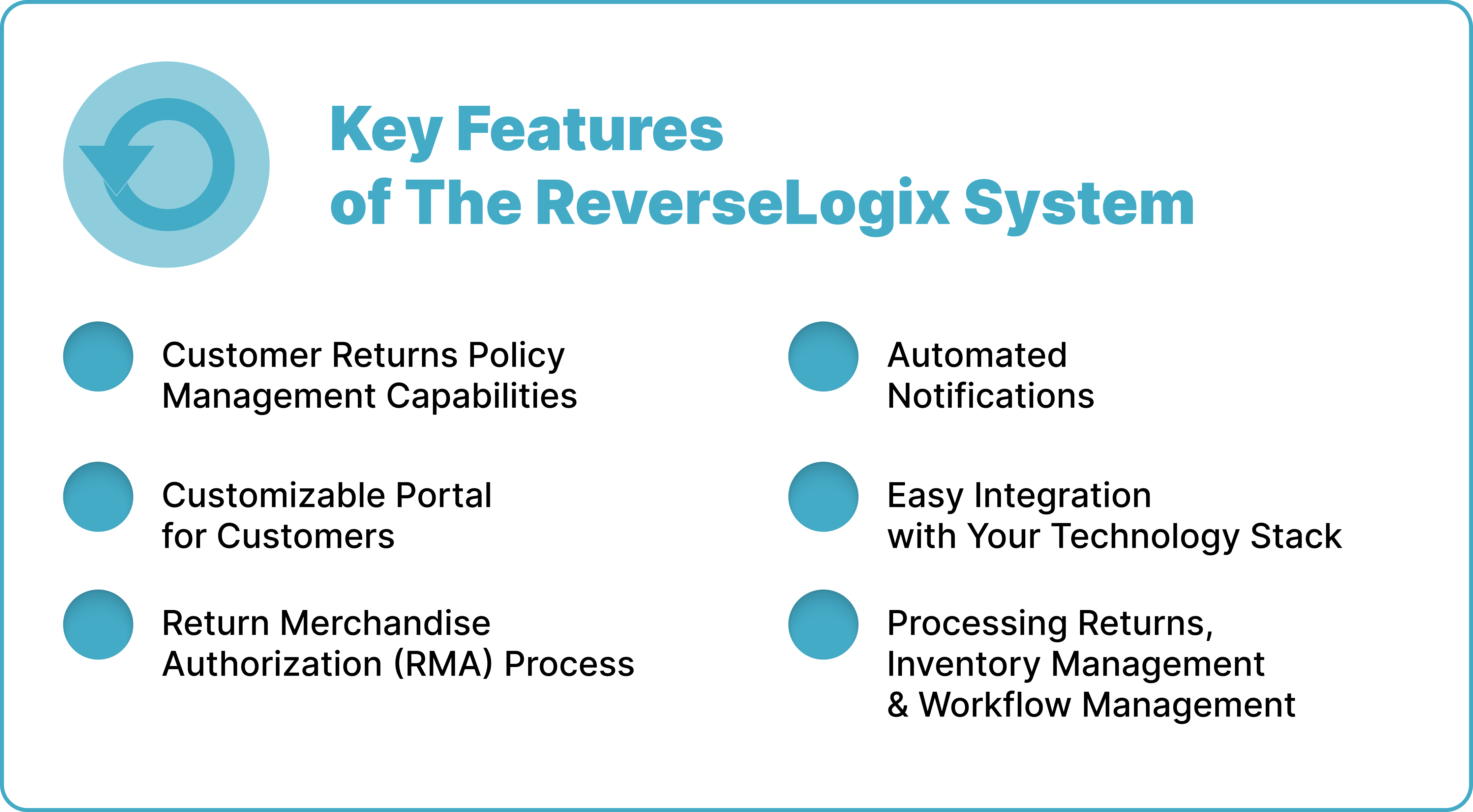Exploring Reverse Logistics Platforms: A Look at ReverseLogix's System

As e-commerce and online retailers continue to rise, the necessity of reverse logistics and a returns management operation continues to reverberate for many ecommerce businesses and supply chain operations. So much so that the reverse logistics market’s size continues to rise. In 2023, it was valued at $1.07 trillion, and it is only expected to continue growing rapidly. This puts the limelight on reverse logistics platforms that make efficient and streamlined returns management possible.
Reverse logistics platforms are crucial in an age where businesses are skilled at fulfilling customer orders, but not well-versed in managing product returns. Since the advent of online retail or e-commerce, the idea of returns has gained much relevance, forcing businesses to work on and seriously consider making their returns management process better.
Reverse logistics is a critical component of effective supply chain management. It addresses the reverse flow due to returns, repairs, and recycling processes. This article will explore the criticality of reverse logistics platforms and how the ReverseLogix platform enables businesses to enjoy stress-free returns management operations.
Importance of Reverse Logistics Platforms
As consumer demands continue to change and adapt, reverse logistics platforms have become increasingly critical to the success of modern retail operations. Optimized reverse logistics play a crucial role in managing delivery failures and ensuring products are either redelivered or returned efficiently, providing financial and environmental benefits. Effective supply chain management includes the forward movement of goods and the reverse flow due to returns, repairs, and recycling processes. Today, about 20 to 30% of goods purchased will be returned. Depending on the size of the business, these numbers can be quite high. Here is why more businesses are turning to reverse logistics management solutions in 2024.
1. Efficiency and Cost Reduction in Reverse Logistics Management
Reverse logistics platforms allow businesses, especially e-commerce brands and platforms, to streamline their entire returns process, from initiation to sorting and then refund, thereby contributing to overall supply chain management efficiency and cost reduction. By optimizing the reverse supply chain, they enhance the handling of products moving back from customers to businesses, which is crucial for managing returns effectively.
They do this successfully by helping them automate essential but repetitive tasks like return authorization, tracking, and inventory management.
With automation well integrated into the reverse logistics process, these businesses can minimize errors and lower the financial impacts of those errors. Automating the entire process also reduces the operational cost, helping the business save money overall.
2. Improved Customer Experience with Customer Returns
Today, the retail landscape has made returns and efficient refunds a requirement for a great customer experience. Effective supply chain management, including reverse logistics, enhances customer satisfaction and loyalty by optimizing costs and ensuring timely processing of returns, repairs, and recycling. However, it is difficult for many businesses to manage those independently, so they rely on reverse logistics providers and platforms for efficient and faster returns processing.
Such investment will, in turn, optimize the customer’s experience by providing them with a seamless process whereby their satisfaction is prioritized. This way, the business is sure of customer loyalty and repeat business.
3. Data-Driven Insights
Each business faces unique problems and reasons for product returns. With reverse logistics platforms, more businesses can capture and analyze valuable data to better understand customers’ behavior and what makes them return products. Supply chain management utilizes this data to optimize operations and improve decision-making.
Some of this valuable data may include customers’ feedback on their experience using the application, reasons for returns, and what they expect or want the company to do better. The data can be used to analyze trends and decide what to incorporate in terms of improving product quality and optimizing inventory levels across the reverse logistics supply chain process.
4. Sustainability and Compliance
Adhering to sustainability is no longer a government or regulatory issue; more customers want the businesses they patronize to be more environmentally conscious. Supply chain management can incorporate sustainability through effective reverse logistics practices that help facilitate proper disposal or recycling of returned products.
Turning to reverse logistics management solutions allows these businesses to effectively minimize waste and contribute much more to the circular economy.
5. Competitive Advantage
Businesses that invest in reverse logistics solutions can offer improved returns experiences to their customers. This provides businesses with a competitive advantage in the market as they can optimize costs and enhance customer satisfaction while maintaining profitability. This, in turn, drives better customer loyalty.
Understanding ReverseLogix’s Returns Management System
ReverseLogix is the only end-to-end return management system in the market that lets you initiate returns, configure return processing, and even handle repairs — all on a single platform. By streamlining the reverse logistics process, ReverseLogix supports supply chain management, optimizes costs, enhances customer satisfaction, and maintains profitability. The platform works for different supply chain stakeholders like retailers, 3PLs, manufacturers, and e-commerce businesses.
It was founded to improve on a status quo that struggled with processing returns, making it a hassle that negatively affected customer relationships, the brand, and the bottom line. With the ReverseLogix platform, every return can be made into a brand-affirming positive and seamless experience, ensuring the customers remain repeat patrons.
Key Features of The ReverseLogix System

ReverseLogix is built with customer-centric features in mind and business intelligence at its core. The RMS platform significantly enhances supply chain management by addressing the reverse flow of goods due to returns, repairs, and recycling processes, helping optimize costs and maintain profitability. As a result, the business greatly improves repurchase rates, enhances satisfaction, and learns from returns in real time.
Some of the key features include:
1. Customer Returns Policy Management Capabilities: Manages diverse returns in a 3PL warehouse, applying different return policies, rules, and workflows based on each customer’s need or product type.
2. Customizable Portal for Customers: B2C and B2B can easily create a beautifully customized returns portal that reflects the brand.
3. Return Merchandise Authorization (RMA) Process: Instantly start tracking a return, validate purchases to reduce the chance of fraud, and plan the workforce in anticipation of return volumes.
4. Automated Notifications: Automates branded notifications to inform customers about their return status.
5. Processing Returns, Inventory Management & Workflow Management: ReverseLogix standardizes rules and policies across business locations, giving customers an easier, more consistent experience.
6. Easy Integration With Your Technology Stack: Out-of-the-box APIs and integrations connect returns to world-class eCommerce and point-of-sale systems, maximizing the RMS’s power.
How It Works
The ReverseLogix software coordinates and streamlines every aspect of the returns journey, including recommerce and after-sales care management. It integrates seamlessly with supply chain management systems to streamline the reverse logistics process. It orchestrates the entire lifecycle of a return based on the business’s specific needs, while centralizing and analyzing relevant returns data from other supply chain software systems.
Wrap Up
In a world where customers are increasingly likely to return purchased items, partnering with a reliable reverse logistics management platform can make all the difference. Reverse logistics platforms are integral to effective supply chain management as they address the reverse flow of goods due to returns, repairs, and recycling processes. That is why itemizing the best solution is important. It gives you an idea of what is obtainable and why you should partner with the best.
ReverseLogix shines as a solution, offering unparalleled features and benefits that cater to businesses of all sizes. By integrating seamlessly with existing systems, ReverseLogix ensures that every return process is handled efficiently, reducing costs and enhancing customer satisfaction. Choosing ReverseLogix means investing in a comprehensive reverse logistics solution that not only meets but exceeds the demands of modern supply chain management. With ReverseLogix, businesses can transform their reverse logistics process into a competitive advantage, ensuring long-term success and customer loyalty. Connect with us today.
Frequently Asked Questions
A reverse logistics system is crucial for e-commerce and online retailers because of the high volume of customer returns in online shopping compared to traditional retail. These e-commerce platforms increasingly leverage solutions that ensure efficient reverse logistics processes to manage these returns effectively and reduce costs. Additionally, reverse logistics platforms contribute to overall supply chain management by addressing the reverse flow of goods due to returns, repairs, and recycling processes, which is essential for optimizing costs, enhancing customer satisfaction, and maintaining profitability.
Reverse logistics platforms help businesses reduce costs by optimizing return processes, minimizing restocking and refurbishment times, and improving inventory management. They can also enhance efficiency by automating tasks, providing real-time visibility into returns, and streamlining customer communication.
Businesses that leverage reverse logistics platforms effectively can gain a competitive edge in the market. By offering superior customer experiences, optimizing processes, reducing costs, and leveraging data analytics for strategic decision-making, companies can differentiate themselves from competitors, improve customer satisfaction and loyalty, and drive long-term growth.
